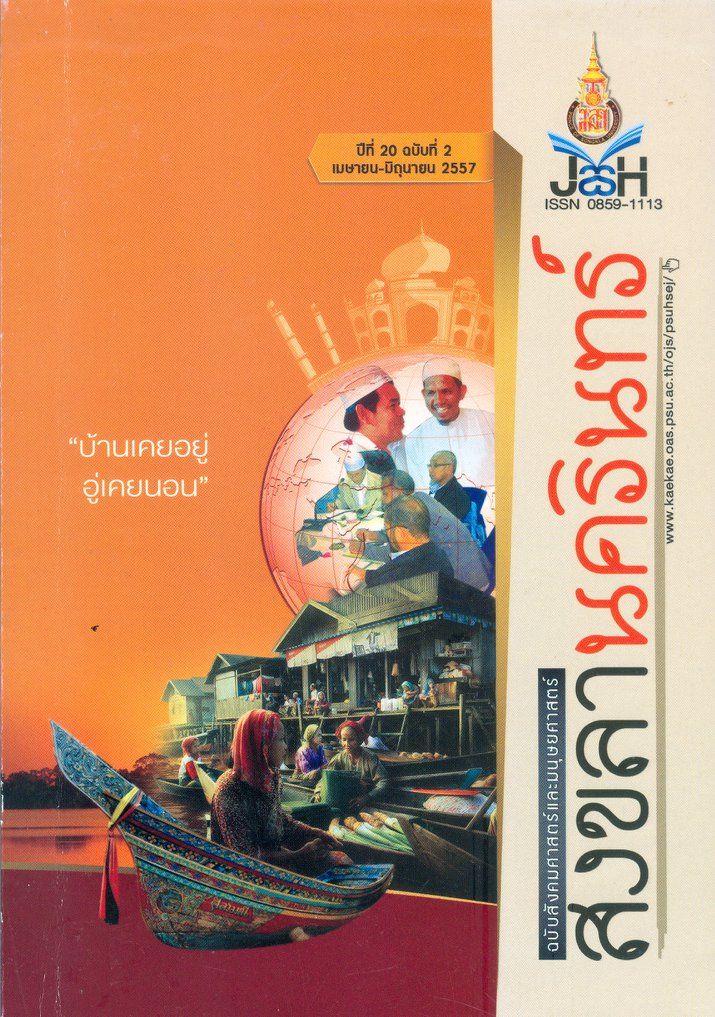<b>องค์ประกอบทางจริยธรรมของนักศึกษามุสลิมในสถาบันอุดมศึกษา</b><br> Ethical Factors of Muslim Students in Higher Educational Institute
คำสำคัญ:
ethics, factor analysis, Muslim students, universityบทคัดย่อ
Abstract
This study aimed to perform a confirmatory analysis on ethical factors of Muslim students in higher educational institute and to examine the perceived and different levels of ethics of Muslim students in higher educational institute as categorized according to ages, years of study, and faculty affiliations. The samples consisted of 875 Muslim students, PSU, campus. The research instrument, Ethical Scale, was developed through exploratory factor analysis. Examination of fit model of ethical factors was based on confirmatory factor analysis. Perceived and different levels of ethics of Muslim student were examined by means, standard deviation, t-test and F-test. The findings show that ethical factors of Muslim students are composed of four dimensions, i.e. interaction with non-Muslims, socialization, moral consciousness, and commitment to faith. Fit model indices of ethical factors indicate relatively high congruence of the hypothesized model with the empirical data as x2/df = 1.734, GFI = .925, AGFI = .899, CFI = .981, RMSEA = .038, and SRMR = .041. The perceived levels of ethics of Muslim students are high in overall and each aspect of four. The levels of ethics of Muslim students from different age groups and different faculty affiliations were found significantly different whereas those from different years of study found not different.
บทคัดย่อ
การวิจัยนี้มีวัตถุประสงค์เพื่อศึกษาองค์ประกอบ เชิงยืนยันทางจริยธรรมของนักศึกษามุสลิมในสถาบัน อุดมศึกษา และเพื่อศึกษาระดับและความแตกต่างของ ระดับจริยธรรมของนักศึกษามุสลิมในสถาบัน อุดมศึกษาจำแนกตามเพศ ชั้นปี และการสังกัดคณะ กลุ่มตัวอย่างเป็นนักศึกษามุสลิม มหาวิทยาลัยสงขลา นครินทร์ วิทยาเขตปัตตานี จำนวน 875 คน เก็บ รวบรวมข้อมูลโดยใช้แบบวัดจริยธรรมที่พัฒนาขึ้นโดย ใช้เทคนิคการวิเคราะห์องค์ประกอบเชิงสำรวจและ ตรวจสอบความสอดคล้องกลมกลืนของโมเดลองค์ ประกอบด้วยการวิเคราะห์องค์ประกอบเชิงยืนยัน และ วิเคราะห์ระดับและความแตกต่างของระดับจริยธรรม โดยใช้ค่าเฉลี่ย ค่าเบี่ยงเบนมาตรฐาน การทดสอบด้วย ค่าทีและค่าเอฟ ผลการวิจัย พบว่า องค์ประกอบทาง จริยธรรมของนักศึกษามุสลิมในสถาบันอุดมศึกษา ประกอบด้วย การปฏิสัมพันธ์กับชนต่างศาสนิก การเข้าสังคม คุณธรรมในตน และการยึดมั่นศรัทธา การตรวจสอบความสอดคล้องกลมกลืนของโมเดล องค์ประกอบ พบว่า โมเดลมีความสอดคล้องกลมกลืน กับข้อมูลเชิงประจักษ์อยู่ในเกณฑ์ดี โดยมีค่า x2/df = 1.734, GFI = .925, AGFI = .899, CFI = .981, RMSEA = .038, และ SRMR = .041 ส่วนระดับ จริยธรรมของนักศึกษามุสลิมภาพรวมและรายดา้ นอยู่ ในระดับมาก และผลการเปรียบเทียบระดับจริยธรรม ของนักศึกษามุสลิมในสถาบันอุดมศึกษาที่มีเพศและ การสังกัดคณะต่างกัน มีระดับจริยธรรมแตกต่างกัน อย่างมีนัยสำคัญทางสถิติ ส่วนนักศึกษามุสลิมที่มี ชั้นปีต่างกัน มีระดับจริยธรรมไม่แตกต่างกัน










